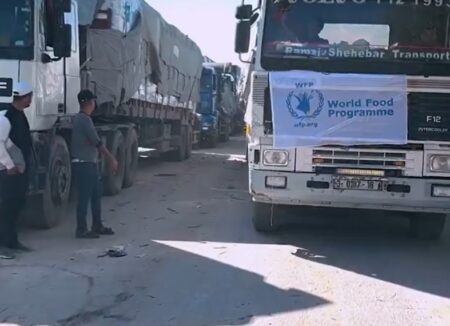For the sixth consecutive day, thousands of families in northern Gaza are enduring a severe shortage of water and food due to the stringent blockade imposed by Israeli occupation forces during their ongoing aggression, which includes massacres and atrocities against civilians.
The besieged citizens are urgently appealing through social media platforms and via phones to their relatives in other parts of the Gaza Strip for aid to save them and their children from dying of hunger and thirst.
For about two weeks, the distribution of relief aid has halted in most areas of northern Gaza because the Israeli army is preventing the entry of aid trucks provided by international and local organizations, according to an Anadolu Agency correspondent.
The United Nations “World Food Programme” (WFP) reported on Thursday that it is unable to distribute food in the northern Gaza governorate due to a lack of supplies.
This situation arises amid strict restrictions imposed by Israel, the occupying power, on the delivery of aid to the Gaza Strip, which several organizations affirmed makes humanitarian response extremely difficult, if not impossible.
The WFP stated on Platform X: “We are no longer able to distribute food in any form in the northern Gaza governorate.”
It added that “the shortage of supplies in Gaza forces us to stop distributing food parcels during October.”
The UN agency continued: “There is no distribution of food, and flour is running out in bakeries in southern and central Gaza.”
In this context, the United Nations Relief and Works Agency for Palestine Refugees (UNRWA) announced that Israeli forces are besieging at least 400,000 Palestinians in northern Gaza.
Since the start of its new ground offensive in northern Gaza on October 6, Israeli forces have besieged Jabalia and its refugee camp, preventing residents from fleeing to nearby Gaza City and ordering them to evacuate only via Salahuddin Street, which runs the length of the eastern Gaza Strip from north to south.
🎦12 months of tragedy and suffering in #Gaza.
As another winter approaches, every day is a struggle for survival.
Hunger remains rampant and the threat of famine persists. Meanwhile, efforts to bring in vital supplies face increasing challenges.
⏹️This must stop.⏹️ pic.twitter.com/afLZl51Uky
— World Food Programme (@WFP) October 10, 2024
This is the third ground invasion carried out by Israeli forces in Jabalia camp since the beginning of the genocide war on Gaza on October 7.
Residents in northern Gaza rely on makeshift wells powered by solar energy and mobile water carts in the streets to meet their basic needs for potable water.
These means have become the primary source of water after Israeli forces deliberately destroyed most public water wells and infrastructure networks during the ongoing genocide war for more than a year.
With the start of the current onslaught on Jabalia town and it refugee camp, the makeshift wells stopped working, and water transport vehicles could not reach the besieged residents.
Ahed Mousa, a young man besieged in Jabalia camp with his father, told Anadolu Agency: “The water ran out yesterday, and only 20 liters remain, which we use for drinking and everything.”
The food security situation in #Gaza has deteriorated over the past few weeks, following dramatic drop in aid supplies coming into the strip. https://t.co/Gomn68bqFT
— World Food Programme (@WFP) October 10, 2024
He added: “If the water runs out, we and our children will die of thirst, and we will not forgive the world for that,” stressing that “going out to get water poses a great danger due to the occupation targeting any movement.”
He continued: “The bodies of several of our neighbors and residents of our neighborhood are lying on the streets, and they cannot be retrieved as they were killed by the Israeli army.”
He added: “If the concerned authorities do not intervene to provide water, a real disaster will occur, as thousands are still besieged in their homes and shelters.”
At the “Yemen Al-Saeed” shelter west of Jabalia refugee camp, citizen Somaya Khater and her family of eight, including four children, are suffering from a lack of water and food.
She informed Anadolu Agency: “We haven’t had any water for a week, and we’re using what little we have very sparingly.”
She explained that they drink minimal amounts to reduce the need for toilets and can’t wash dishes due to the water shortage, fearing it will run out before the blockade is lifted.
Adham Hijazi, a resident of the besieged “Beit Lahia Project” area, mentioned, “Some wealthier families stored enough food for weeks and are now using those supplies, while poorer families are suffering immensely.”
He noted that the remaining food for his family of nine would last only two or three more days, after which they would face the threat of hunger.
He added that international and local relief organizations had to leave the area due to the bombardment, and their warehouses are empty because the blockade prevents the arrival of aid trucks.
He pointed out that “charitable kitchens have ceased operations, and people in shelters are starving, waiting for aid.”
With the onset of the ground invasion, farmer Youssef Al-Radhi and his family, along with their neighbors, fled from the border town of Beit Lahia to the center of Jabalia camp.
He said: “We couldn’t bring food or belongings with us, and there are no food supplies available for purchase in Jabalia. The besieged residents have nothing to eat.”
Al-Radhi had planted his land with eggplant and pepper crops to achieve self-sufficiency and sell the surplus, but he had to leave it behind without harvesting.

